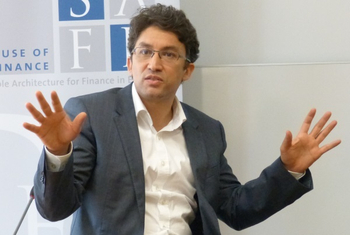 On July 13, Xavier Ragot, Professor of Economics at the Paris School of Economics and President of the Observatoire Français des Conjonctures Économiques (OFCE) gave a SAFE Policy Lecture on “France and Germany – inevitably on diverging paths?” Ragot was introduced by Hans-Helmut Kotz, Research Center SAFE and Harvard University.
On July 13, Xavier Ragot, Professor of Economics at the Paris School of Economics and President of the Observatoire Français des Conjonctures Économiques (OFCE) gave a SAFE Policy Lecture on “France and Germany – inevitably on diverging paths?” Ragot was introduced by Hans-Helmut Kotz, Research Center SAFE and Harvard University.
Ragot outlined topical symptoms and problems of the euro area. He proposed the perspective of a triangle of problems with unemployment and low short-term growth in one corner, public debt in the second corner and nominal divergence in the third, arguing that France and Germany would differ in the degree of importance they attribute to these problems. While Germany was focusing on the problems of nominal divergence and debt, France would put more emphasis on unemployment than debt.
According to Ragot, the economic development in France and Germany has been diverging only recently. For example, the debt to GDB ratio of both countries almost coincided between 1990 and 2012 while it has been diverging significantly since then. Also, there has emerged a huge contrast in recent years between the joint monetary and interest rate policy and the very unequal natural interest rates that the single economies would actually need (high in Germany, negative in France and Italy). This has caused high costs, mainly since 2010, which Ragot called “the costs of the euro”. Only recently, natural interest rates have begun to converge again.
On the supply side, Ragot illustrated the diverging paths with reference to the strongly differing degrees of total factor productivity as well as to the gap in weighted unit labor costs between Germany (low), France (medium) and Italy (higher). He also mentioned the high current account surplus in Germany, opposed to a deficit in France, as an example for the disharmonies within the Eurozone. As measures to correct the imbalances he suggested a European unemployment insurance of 1-2 percent of GDP, more public investment and a wage increase in Germany as well as wage responsibility in other European countries.
The audience strongly questioned the French perspective of Xavier Ragot and argued for more efforts in southern Europe to catch up with Germany’s economic strength instead of asking Germany to deliberately slow down its economy. It was pointed to the huge public spending in France that would leave the government almost no room for manoeuvre. This could be addressed e.g. by more efforts to cut public spending, as has been done in Germany, which would help to lower the debt ratio and the interest burden and thus create leeway to invest.

